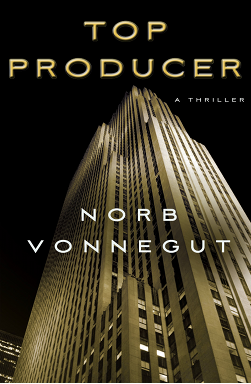Top Producer by Norb Vonnegut is a well written, interesting business thriller, and about three quarters of his readers on Amazon agree with me.
 Vonnegut employs the first-person point of view, as well as the financial jargon of a professional, to convincingly put the reader in the shoes of a successful stockbroker in Midtown Manhattan. Grove O’Rourke, Southern-born and Harvard-educated, works for an investment bank, a place where “the elite go to get ideas and leave their money.” He handles approximately two billion dollars, and being a “top producer,” consistently delivers good returns.
Vonnegut employs the first-person point of view, as well as the financial jargon of a professional, to convincingly put the reader in the shoes of a successful stockbroker in Midtown Manhattan. Grove O’Rourke, Southern-born and Harvard-educated, works for an investment bank, a place where “the elite go to get ideas and leave their money.” He handles approximately two billion dollars, and being a “top producer,” consistently delivers good returns.
Vonnegut’s first-person writing paints a vivid picture of O’Rourke’s pressure cooker of a life. In addition to acquiring and retaining clients, investing their assets, and “holding their hands,” he must cope with constant backbiting, manipulation, and game playing by colleagues and competitors who connive to steal his business.
The conceit of the novel is as follows: Grove’s closest friend, universally liked Charlie Keleman, is a flamboyant, free-spending manager of a boutique bank that invests in “funds of funds.” Charlie organizes a birthday party for his wife Samantha at an aquarium. During the belly dancer’s routine, and with five hundred guests looking on, someone pushes Charlie into the fish tank, where he is eaten by the resident sharks. Shortly after the tragedy, Samantha contacts Grove and informs him that she needs his help to locate Charlie’s money—she was not involved in the business; she has no idea where he parked their personal or business assets; and she has only $600 in her bank account.
So, the reader is now confronted with two questions:
- Who threw Charlie into the tank and why?
- Where is the money?
Grove insists on lending Samantha $75,000 to help her through the crisis, an action that will ultimately make him a “person of interest” when the detectives start their investigation. And he agrees to help her extricate herself from the financial morass. Vonnegut follows Grove as he attempts to unwind the two mysteries, cope with the detectives assigned to the case, and face both the revealed and unrevealed villains who are determined to keep the mysteries unsolved—all while attempting to preserve his lucrative investment practice and fight off his so-called colleagues who are “smelling blood in the water.”
The novel has two weaknesses, one minor, and one major.
- Vonnegut introduces some over-the-top minor characters who come across as almost cartoonish. Also, Grove’s occasional aphorisms spoken to the reader (Woody Allen–like) periodically interrupt the fictive dream.
- In light of his education and experience, Grove’s willingness to assume the dual roles of forensic accountant and private detective to solve the twin mysteries, while trying to preserve his businesses and not run afoul of the law, requires a whopping dose of suspension of disbelief.
Nevertheless, the novel’s strengths more than make up for its weaknesses:
-
- In Grove O’Rouke, Vonnegut has created a strong character who is truly a nice guy. His efforts to help Charlie’s wife resolve the mess that she is in, while often amateurish, are laudable. It is easy for the reader to identify with and root for him.
- A reader who is motivated to learn something about the nuts and bolts of high finance and security trading will be amply rewarded.